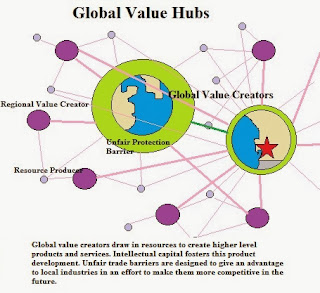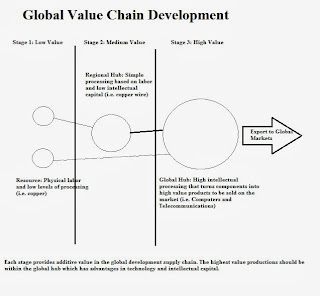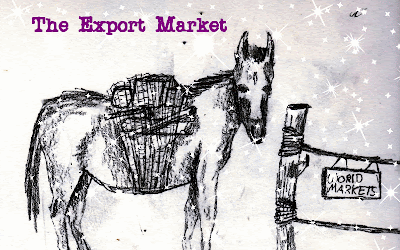Free trade agreements are a common economic method
of increasing trade. Free trade agreements work best where lower value imports
are used to create higher value exports. Global hubs often work with regional hubs in an international
supply chain that continues to develop products for exportation to world
markets. Effective economic hubs use intellectual capital to create value that
cannot be easily copied by other countries.
According to Chong and Hur (2008) each hub has
access through trade agreements to the spokes but the spokes only have access
to the hub. This means that the hub can sell more products and services than
the spokes can themselves. This advantage gives them preferred trading and
profitability standards. It also creates a value chain with the highest hub
realizing the most benefits.
 Because hubs are central locations, they also can have
an advantage in investments (Wonnacott, 1996). Those who seek to maximize their
investment opportunities will invest their money through the purchasing of
stocks or starting businesses within the hub (i.e. supply chain). They are
aware that this is the fastest place for them to grow their capital. This in
turn spurs additional economic growth in the area and develops opportunities
for product development.
Because hubs are central locations, they also can have
an advantage in investments (Wonnacott, 1996). Those who seek to maximize their
investment opportunities will invest their money through the purchasing of
stocks or starting businesses within the hub (i.e. supply chain). They are
aware that this is the fastest place for them to grow their capital. This in
turn spurs additional economic growth in the area and develops opportunities
for product development.
A problem occurs when two mega hubs are not
competing on the same assumptions. For example, Chinese tariffs on U.S. made
automotive products are designed to protect Chinese budding suppliers (Jian,
2008). When this occurs, one country has an advantage as they are willing to
sell their products without tariffs to the U.S. but will not accept American
products. The free trade cycle is broken.
In order for the mega hubs to operate correctly
individual components of production should be purchased at a lower price and
then assembled with intellectual labor into higher value products that are sold
on the market. If these products are built else ware and sold primarily within
the U.S. there is no export advantage, revenue, or growth. A decline occurs
because the consumer culture is soaking up the value locally instead of
properly exporting.
Hubs should
be creators of wealth. They should use both imported and locally generated
resources to develop them into higher value products for export. When this does
not occur, it is likely that the export gain will turn into an import loss.
Those hubs that export products will grow while those that only distribute
imported products are likely to decline. It is the total value of the flow that
determines growth or decline in regional development.
Chong, S. & Hur, J. (2008).
Small hubs, large spokes and overlapping free trade agreements. World Economy, 31 (2).
Jain, Y. (2008). Wto rips china’s
tariffs on imported auto parts. Automotive News, 82 (6295).
Wonnacott, R. J. (1996a), ‘Free-Trade
Agreements: For Better or Worse?’, American Economic
Review,
86,
2, 62–66.


No comments:
Post a Comment